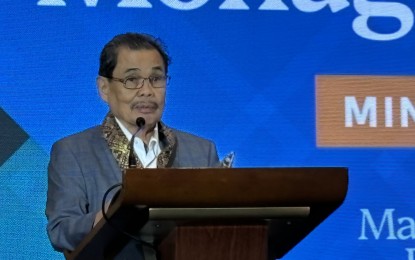
MADRASAH EDUCATION. Bangsamoro Basic, Higher and Technical Education Minister Mohagher Iqbal during the Madrasah Education Partners Forum in Makati City on Thursday (July 18, 2024). The Bangsamoro government has launched a three-year plan to enhance madrasah education in the region. (Photo by Joyce Rocamora)
MANILA – The Bangsamoro local government has launched on Thursday a three-year plan to enhance madrasah education in the region.
At a forum in Makati City, the Bangsamoro Ministry of Basic, Higher and Technical Education (MBHTE) presented the new Madrasah Education Strategic Plan (MESP), which lays out its commitment to enhance the quality of formal madrasah system in the region from 2024 to 2026.
Madrasah is an Islamic educational system that aims to develop Muslim learners to be morally upright and committed to excellence.
In a speech, Bangsamoro BHTE Minister Mohagher Iqbal said this system is “integral” in building the foundation to a lasting peace in the region.
“Madrasah education is not just an education system but a way of life embodying our values,” he said.
“Establishment of a public madrasah education system is not only a matter of compliance to the Bangsamoro Organic Law— it is an aspiration of our people,” he added.
Under the Plan, the Ministry aims to establish an integrated curriculum in madaris (plural of medrasah) and basic education, as well as enhance the quality of teaching in madrasah institutions.
The Australian government provided technical assistance to the Ministry in developing the MESP and conducted policy reviews of madrasah education, led consultation sessions with relevant partners, and facilitated expert consultations to support the drafting process.
"Australia is a very longstanding partner of the BARMM in peace-building and we recognize that education is crucial to long-term stability and development,” Australian Embassy Deputy Head of Mission Moya Collett said.
"I thank our friends and partners from the Ministry for their continued dedication in strengthening education policies and institutions in the BARMM. Australia remains committed to working with you in shaping a more peaceful and prosperous region," she added.
The Bangsamoro government provides a “two parallel formal systems” in delivering basic education in the region, the public school system and the madrasah system.
Based on its latest data, there are 373 formal madaris delivering K-12 and Islamic education for 34,762 learners in the region, and at least 720 non-formal madaris catering to 101,124 students.
A policy guide developed with the Australian government is also supporting the accreditation of 444 non-formal madrasah.
To date, there are a total of 1,086,027 students in BARMM, including enrollees from private madaris.
In a press conference, Iqbal said the Bangsamoro government also hopes to sit down with new Education Secretary Sonny Angara to resume discussions on the curriculum of madrasah.
“We would like to see a situation wherein there will be an immediate meeting with the new secretary and discuss that issue of curriculum of madaris,” he said.
“[W]e need a clear and formal understanding or agreement with the Department of Education that graduates from the public madrasah can be admitted elsewhere in the Philippines and that would require a sort of a formal agreement with the DepEd,” he added.
At the forum, the Ministry said it aims to increase the number of Bangsamoro learners— regardless of gender, physical ability, and social and economic status— by 30 percent in 2028. (PNA)
